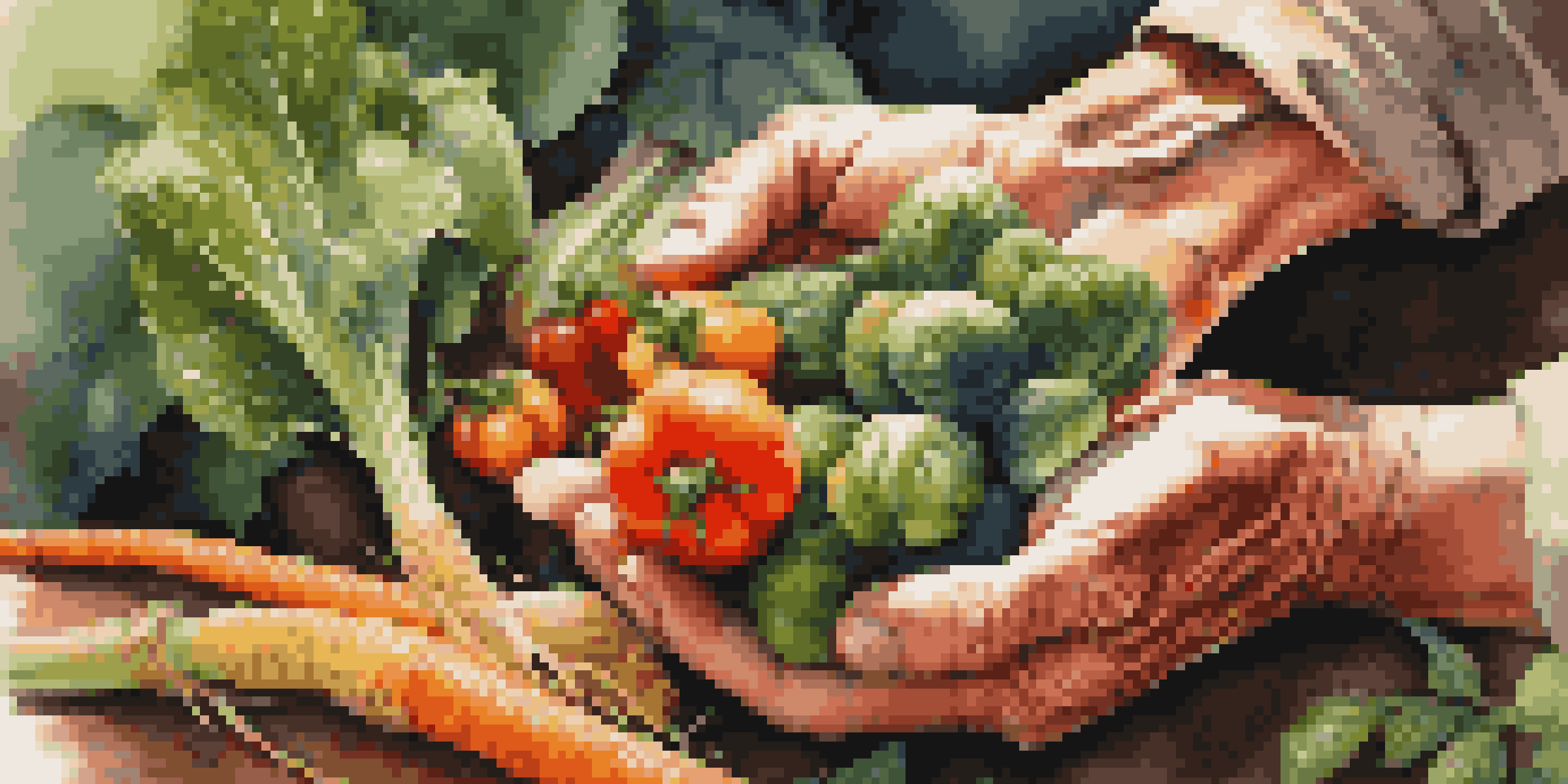Smart Contracts in Agriculture: A Field of Opportunities

Understanding Smart Contracts: The Basics Explained
Smart contracts are self-executing contracts with the terms of the agreement directly written into code. Imagine them as digital vending machines: you put in your money, and the machine delivers your snack without needing a cashier. This technology operates on blockchain, providing transparency and security, which is especially beneficial in agriculture.
The future of agriculture is not about technology; it's about the people who grow our food and the systems that support them.
In the agricultural sector, smart contracts can streamline processes such as payment for goods, ensuring that conditions are met before transactions are completed. For instance, a farmer could set up a smart contract to receive payments only once their produce is delivered and verified. This eliminates delays and disputes, making the entire transaction smoother.
By automating these agreements, smart contracts reduce the need for intermediaries, like brokers or lawyers. This not only cuts costs but also speeds up transactions, allowing farmers to focus on what they do best: farming. As we delve deeper into this topic, let’s explore the specific opportunities that smart contracts can offer in agriculture.
Enhancing Supply Chain Transparency with Smart Contracts
One of the most significant advantages of smart contracts in agriculture is the increased transparency they bring to the supply chain. Imagine being able to track every step of your food from farm to table, knowing that each transaction is recorded and immutable. This level of transparency can build trust among consumers and producers alike.

For example, a smart contract can provide real-time data on the status of crops, ensuring that all parties have access to the same information. This can help prevent issues like food fraud, where products are misrepresented, and ensures that consumers are buying exactly what they think they are. Transparency can lead to enhanced consumer confidence, which is invaluable in today’s market.
Smart Contracts Enhance Transparency
Smart contracts increase supply chain transparency in agriculture, allowing consumers to trace food from farm to table.
Moreover, by utilizing smart contracts, farmers can quickly pinpoint inefficiencies in their supply chains. If a delivery is delayed, the contract can automatically alert all parties involved, allowing for quicker resolutions. This proactive approach can save both time and money, making the agricultural supply chain more efficient overall.
Reducing Costs and Risks Through Automation
Smart contracts can significantly reduce costs for farmers by automating various processes. Instead of spending hours negotiating terms or processing payments, smart contracts execute automatically based on predefined conditions. This means that farmers can save on labor costs and invest their time in improving their operations.
Blockchain technology is a powerful tool for farmers to secure their financial future and enhance transparency in their operations.
Additionally, the use of smart contracts mitigates risks associated with traditional agreements. For instance, if a supplier fails to deliver the agreed-upon seeds, the smart contract can automatically trigger a refund or alternative solution. This level of security is particularly appealing in an industry where uncertainties, such as weather or market fluctuations, can impact profits.
By minimizing financial risks and enhancing operational efficiency, farmers can focus on innovation and growth. As we explore the practical applications of smart contracts in agriculture, it becomes clear that they offer a pathway to a more resilient and profitable industry.
Improving Payment Processes for Farmers
Payment processes in agriculture can be cumbersome, often involving multiple parties and delays. Smart contracts simplify this by ensuring that payments are executed automatically when certain conditions are met. For instance, once a shipment of produce is confirmed at a distribution center, the payment can be released immediately to the farmer.
This not only speeds up cash flow for farmers but also reduces the risk of non-payment. In traditional scenarios, farmers may have to wait weeks or even months before receiving their earnings, creating financial strain. With smart contracts, they can maintain a steady cash flow, which is crucial for managing operational costs.
Automated Payments Improve Cash Flow
By automating payment processes, smart contracts ensure farmers receive timely payments, boosting their financial stability.
Moreover, the transparency of blockchain technology allows farmers to verify that they are receiving fair prices for their produce. By having access to real-time market data, they can make informed decisions and negotiate better terms. This empowerment can lead to a healthier bottom line and long-term sustainability in the agricultural sector.
Smart Contracts and Crop Insurance: A Game Changer
Crop insurance is essential for protecting farmers against losses due to unforeseen events like natural disasters. However, the claims process can often be complex and slow. Smart contracts offer a solution by automating the claims process, allowing farmers to receive compensation more quickly and efficiently.
For example, a smart contract could be programmed to automatically trigger payouts based on satellite data indicating crop damage. This means that farmers don’t have to wait for an adjuster to assess the damage; they receive financial support right when they need it most. This immediate response can be crucial for farmers trying to recover from a loss.
Incorporating smart contracts into crop insurance not only accelerates payouts but also enhances transparency in the claims process. Farmers can track the status of their claims in real-time, reducing confusion and frustration. This innovative approach can ultimately lead to a more resilient agricultural sector, better equipped to handle the uncertainties of farming.
Empowering Smallholder Farmers with Smart Contracts
Smallholder farmers often face numerous challenges, from limited access to markets to financial instability. Smart contracts can empower these farmers by providing them with the tools they need to thrive. By simplifying transactions and lowering costs, smallholders can connect directly with buyers and suppliers without intermediaries.
For instance, a small farmer could establish a smart contract with a local grocery store, ensuring that they receive fair payment for their produce without dealing with middlemen. This direct connection not only improves their income but also fosters community relationships, as local businesses support local farmers.
Empowering Small Farmers
Smart contracts provide smallholder farmers with direct access to markets and financing, enhancing their income and sustainability.
Additionally, smart contracts can help smallholder farmers access credit more easily. By providing verifiable data on their production and sales, they can prove their reliability to lenders, making it easier to secure financing. This access to funds can be the difference between thriving and merely surviving in a challenging market.
The Future of Agriculture: Smart Contracts Leading the Way
As we look towards the future, it’s clear that smart contracts will play a pivotal role in transforming agriculture. The potential for increased efficiency, transparency, and profitability is exciting for farmers and consumers alike. With ongoing advancements in technology, we can expect to see even more innovative applications of smart contracts in the agricultural sector.
Farmers who embrace this technology will likely find themselves at a competitive advantage, reaping the benefits of streamlined processes and improved market access. As smart contracts become more widespread, they can help create a more sustainable and resilient agricultural landscape, capable of meeting the challenges of climate change and global food security.

Ultimately, the integration of smart contracts into agriculture is not just about technology; it’s about empowering farmers, enhancing food security, and fostering a more connected food system. As we continue to explore these possibilities, one thing is certain: the future of agriculture is bright, and smart contracts are leading the way.